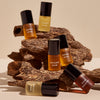

Step 1 – The infection
Agarwood, known as aloeswood to some, is a fragrant dark resinous wood. It is formed in the heart of Aquilaria trees only when an insect penetrates the outer layers of the tree, leaving it vulnerable to the air around.
At this point the tree is vulnerable, but how does the tree then produce a wonderful smell? Well, the tree needs to be infected with a specific type of fungus.
Prior to infection, the tree is odourless and pretty much looks normal. Once the infection occurs, the tree starts a defensive mechanism that produces an oily dark resin that then changes the odour, colour and composition of the tree
Step 2 - Sorting Agarwood chips
An artisan is someone who is extremely skilled in their line of work, known to some as beyond master level skill. The artisan is tasked with sorting through the unprocessed distillery chips as he removes the unusable wood, leaving only the sinking-grade resinous agarwood for incense and the distillation process to become Oud.
Step 3 - Processing Oud Chips
The artisan will soak the agarwood chips for quite a while, until they are ready to be put in for distillation. This is an art, as there are over 150 compounds within agarwood that all create a distinct smell, the artisan is tasked with separating different pieces of wood which will result in various essences of the pure Oud oil.
Step 4 - The Distillation Process
After soaking, the distillery chips are transferred to the distillery where the distillation will inevitably begin. Two distillation techniques are common. Forced steam distillation is used in Indonesia, while hydro-distillation is more common in Indian, Cambodia and Thailand. These methods leave their distinct scent on the final Oud oil.
Step 5 – Final step
Once the Oud oil has gone through the distillation process, the Oud oil is kept in open sunlight to evaporate any excess moisture within the Oud oil. This ensures that the Oud oil is as pure as possible to be used in perfumes, or incense, or any way you want!
These artisans would, in the good old days of ancient civilization, create these aromas without the complication distillation step we have in the modern world today. Because of Oud oils vast use throughout history, they are an important aspect of many cultures around the world including Indian, Arabian, and Chinese. Oud oils are also becoming ever more popular throughout modern western society, the industry grows larger and larger every year!


